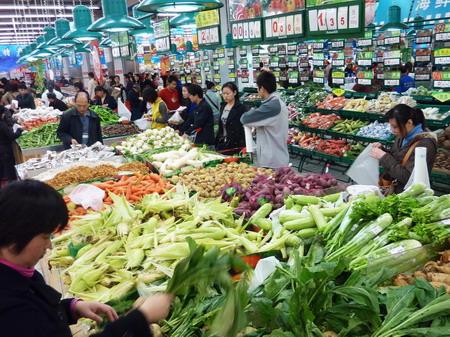
People choosing vegetables at a supermarket in Ningbo, Zhejiang province. China is stepping up efforts to simplify the means of bringing agricultural products to the marketplace to reduce costs and address rising inflation. [Photo / China Daily]
Major retail chains deal directly with farmers in trial, cutting costsBEIJING - China is stepping up efforts to simplify the means of bringing agricultural products to the marketplace to reduce costs and address rising inflation.
These efforts will also help international retail giants such as Wal-Mart and Carrefour optimize their purchasing systems in China and ease the way for exports of agricultural products, said officials.
The 12th Five Year Plan (2011-2015) sets as a goal that consumers in medium and large cities will be able to buy one-third of their fresh produce at supermarkets, as opposed to the current 15 percent, said Minister of Commerce Chen Deming on Wednesday.
With the fiscal support of the central government, the Ministry of Commerce and the Ministry of Agriculture jointly launched a pilot program in 2009 that has been making it easier for international and domestic supermarkets to purchase directly from farmers.
In the past two years, supermarkets in China have signed contracts with farmers totaling 5 billion yuan ($755 million), reducing the average cost of bringing agricultural products to marketplace by 10 to 15 percent, Chen said.
Han Changfu, minister of agriculture, said the program was effective in fighting price increases in agricultural products throughout October and November, with vegetable prices remaining relatively stable in supermarkets.
Owing in part to the rising prices of agricultural products, the consumer price index (CPI), a major gauge of inflation, hit a record 5.1 percent in November, intensifying pressure on policymakers to ease inflation.
The program has helped train farmers in brand-building and the income of those involved rose on average about 4,000 yuan, according to the statistics.
About 2,000 companies have participated in the initiative, including Wal-Mart, Carrefour and the domestic supermarket Wu-Mart.
"The program has played an active role in expanding the consumption of domestic produce, safeguarding the market supply and stabilizing prices of agricultural products," Chen said.
However, he added that the mechanisms need to evolve further to enlarge the coverage and attain balanced development among regions and areas.
Chen called on big retailers to purchase more produce directly from farmers in second- and third-tier Chinese cities and said such programs will help introduce international quality-certification systems to these areas to improve food safety.
"Imports of China's agricultural products are larger than exports, and a more standardized domestic market and circulation system will help Chinese agricultural products entering international markets," Chen said.
As of November, Wal-Mart, the world's biggest retailer, had set up 62 produce-purchasing bases in 18 Chinese provinces and cities. It now buys agricultural products from 730,000 farmers nationwide.
Carrefour, the second-largest retailer, has set up purchasing centers in 19 cities and established cooperation with more than 300 production bases .
Foreign trade is expected to slow in 2011 and the government is increasingly working at boosting domestic consumption.
China's total retail sales rose by 18.4 percent year-on-year to 13.92 trillion yuan in the first 11 months, according to the National Bureau of Statistics.





